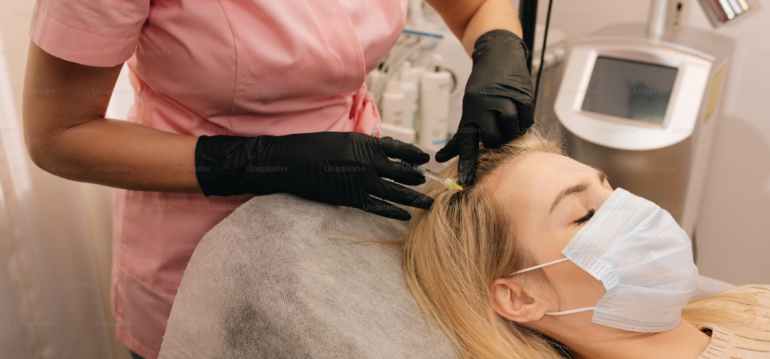
Is your once-luscious hair looking limp and lifeless? Thinning hair is a common concern for many women, but it doesn’t have to be a mystery. This guide dives deep into the top 7 reasons why hair might be thinning, helping you understand what’s happening and find solutions, including exploring options offered by London hair loss clinics.
Table of Content
ToggleShedding vs. Thinning – Understanding Hair Loss
Everyone sheds hair regularly. However, there is a major difference between routine shedding and hair loss. Normal hair growth is a cycle, which includes a shedding phase. This means a healthy hair follicle will grow and shed regularly. The average person will lose 50-100 hairs daily, with more growing shortly after to replace these. Hair loss that exceeds this normal rate of shedding can lead to visible thinning and loss of volume.
7 Culprits Behind Women’s Thinning Hair (Explained by Experts)
While most men experience hair loss due to age and genetic male pattern baldness, there are many more – and more complex – reasons for female hair loss. Just some of these include:
· Hormonal shifts. Pregnancy is a well-known cause of hair loss in women, but did you know that other hormonal shifts could also play a part? Menopause, thyroid issues, and other conditions can all contribute to thinning hair.
· Stress. Stress is a high-ranking cause for many health conditions. This is because stress causes a chemical called cortisol to be released in the brain and body, which can have serious side effects. Chronic stress and high cortisol levels can both contribute to high levels of shedding, thinning, and eventually loss of hair.
· Nutritional deficiencies. Many people do not have the balanced diets required for the proper health of hair, skin, and other tissues. Inadequate levels of vitamin D, iron, and many other nutrients can cause hair loss. Dietary changes or supplements can help with this but should only be taken under medical supervision or advice.
· Hairstyles and hair care practices. Human hair is one of the most abused tissues of the body. While we strive to pamper and care well for our skin, teeth, and the many organs of the body, hair is mistreated in the name of fashion. Harsh chemical treatments, excessive heat styling, and tight hairstyles all contribute to damage that can cause breakage and hair loss.
· Underlying medical conditions. There are also numerous medical conditions that can lead to hair loss. Some of these are obvious, such as alopecia areata. Others are not so straightforward, such as autoimmune conditions that weaken the hair follicle along with other parts of the body. If you suspect you may have one of these conditions, it is always best to work with a doctor to find a diagnosis and treatment plan that works for you.
· Ageing. Just as men lose their hair as they age, so too do women. While women’s hair loss as they age is less common and less severe, it can still be a major factor in why you are seeing thinner and less voluminous hair.
· Genetics. If women in your family have a history of hair loss, this could also be a factor in your own thinning. Talk to your relatives to find out more about these patterns and whether they might be contributing to your hair loss.
Unfortunately, these are not the only reasons for hair loss. There are many other potential causes, some of which are easy to solve – and others are less so. Many of these causes may require medical testing to properly label.
Addressing Thinning Hair – Next Steps
While it might feel like you are powerless to address female hair loss, there are some steps you can take on your own to do so.
· Focus on what you can control. While many of the factors of hair loss are outside of your control, many others are not. Changing the ways you care for and style your hair is a great start for reducing hair loss, as is speaking to a medical professional to rule out any underlying medical causes. Sometimes, all it takes is the right medication or lifestyle change to restore your hair to optimal health!
· Explore hair-healthy habits. There are many other habits that can improve the health of your hair beyond just gentler styling and proper hair care. Consider improving your diet, including taking hair health supplements, if your doctor recommends them. You may also want to reduce stress where possible and get more sleep to ensure whole-body health.
. Consider a female hair transplant. For some women, none of these changes make enough of a difference. If this is your situation, you might want to consider consulting a London hair transplant clinic about a female hair transplant. By working with a hair transplant professional, you can create a personalized treatment plan. Explore clinics like The London Hair Clinic or Harley Street Hair Clinic for female hair transplant evaluations and to learn more.
London Hair Loss Clinics – Resources for Women
It is important to remember that not all places that offer hair health consultations are equally qualified. Working with a qualified London hair transplant clinic will ensure that every step of the process – from evaluation to procedure and beyond – is handled by experienced professionals. these clinics offer consultations with experienced hair loss specialists (dermatologists or trichologists) who can diagnose the cause of hair loss and recommend the most suitable treatment options, including but not limited to female hair transplants.
Conclusion
Dealing with female hair loss can be frustrating, embarrassing, and isolating. But you are not alone. Remember that millions of other women suffer from similar issues and have found treatment success through better hair health habits and working with qualified professionals. If you want that same success, start by speaking with the staff at a London hair clinic to learn more about available options today.


